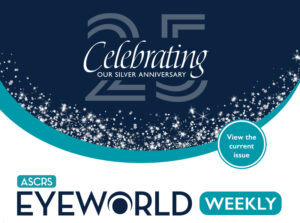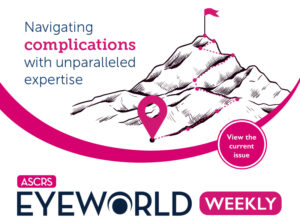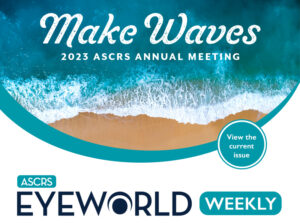FDA approves new excimer laser technology
Bausch + Lomb announced FDA approval of its TENEO Excimer Laser platform. TENEO is approved to perform LASIK correction for myopia and myopic astigmatism. According to the company, this is the “first excimer platform approved in nearly two decades.” Bausch + Lomb touts updates in accuracy, efficiency, and usability with this platform.
Phase 3 trial to evaluate phentolamine for treatment of decreased visual acuity
Ocuphire Pharma announced that, after receiving an agreement from the FDA under a Special Protocol Assessment, it will begin a Phase 3 trial to evaluate phentolamine ophthalmic solution for treatment of decreased visual acuity in the mesopic lighting conditions (poor night vision). According to the company’s press release, patient enrollment is expected to begin within the first quarter of this year. There are currently no FDA approved pharmaceuticals for this indication. According to the press release, Ocuphire’s clinical trial protocol and planned statistical analysis for this trial “could adequately address objectives supporting regulatory submission and potential future marketing application in this indication.” The Phase 3 trial will be multicenter, randomized, double masked, and placebo controlled to evaluate safety and efficacy of phentolamine ophthalmic solution in up to 200 participants. The primary endpoint will be gain of 3 lines (15 letters) or more of distance vision on a low-contrast chart in mesopic conditions after 15 days of product use.
Phase 2 trial of investigational dry eye drug sees effect on signs and symptoms
OKYO Pharma announced statistically significant positive effects with OK-101 ophthalmic solution on signs (total conjunctival staining) and symptoms (burning/stinging and blurred vision) of dry eye in its Phase 2, first-in-human trial of the investigational drop. According to the company’s press release, these effects were seen as early as day 15 after twice-daily dosing in the double-masked, randomized, placebo-controlled study that has enrolled 240 participants with dry eye disease. Patients were divided into cohorts to receive 0.05% OK-101 (n=80), 0.1% OK-101 (n=80), or vehicle (n=80). The total treatment duration was 14 weeks, with the first 2 weeks being placebo only for all groups to “exclude placebo responders,” the company reported. According to the company, treatment-related adverse effects were similar to those observed in the placebo arm. The company plans to advance OK-101, a lipid conjugated chemerin peptide agonist of the ChemR23 G-protein coupled receptor, into Phase 3 trials.
Study has new findings to promote corneal healing
Research published in the American Journal of Pathology reports that α-melanocyte–stimulating hormone (α-MSH) has been found to promote corneal healing in the setting of persistent corneal edema and a model of injury-induced endothelial decompensation. According to an Elsevier press release, this research presents “compelling evidence” that activation of the melanocortin receptor system is a promising therapeutic pathway for disorders like Fuchs and in corneal transplants. The study found that α-MSH was able to prevent corneal endothelial cell death, restore normal endothelial function, aided in the cornea returning to its normal thickness, and caused corneal cells to regenerate.
ASCRS news and events
- ASCRS Annual Meeting: Tier 1, early bird pricing for the ASCRS Annual Meeting ends January 17. Learn more about the premier educational and networking event for anterior segment surgery here.
- Eyecelerator @ ASCRS: Eyecelerator, a partnership between ASCRS and the American Academy of Ophthalmology, is bringing back The Winning Pitch Challenge to Eyecelerator @ ASCRS, April 4, in Boston, Massachusetts. Submissions for The Winning Pitch Challenge are being accepted now through February 2. Cash prizes for winners are worth up to $25,000. Find more information on submissions here.
Research highlights
- Paper waste generated each year from instructions for use (IFU) brochures that are included within the packaging of IOLs in Europe and U.S. was evaluated in a study published in the Journal of Cataract & Refractive Surgery. According to the paper, a sample of IOLs were collected from a couple of centers, and from there the cumulative weight of the IFUs from IOL packaging in the U.S. and Europe based on the number of procedures annually was estimated. This estimate came out to be 153 tons. The authors wrote that if manufacturers were to transition to electronic IFUs, the weight saved would be 128 tons, which they equated to 120 tons of carbon dioxide equivalent (preservation of more than 2,000 trees). The authors noted that the “adoption of e-IFUs has already been authorized in Europe and the U.S.”
- The visual outcomes of 225 eyes that had EVO/EVO+ (STAAR Surgical) implantable collamer lens (ICL) at a single center were evaluated in a retrospective study published in the journal Clinical Ophthalmology. The investigators reported that the implantation of the ICLs took place between April and October 2022; just over 51% were toric. The 12.6 mm ICL was used in 56.4% of cases, followed by 27.5% receiving the 13.2 mm ICL, 15.1% the 12.1 mm ICL, and 0.9% the 13.7 mm ICL. Ninety-five percent of eyes that had a preop BCVA of 20/20 or better achieved postop UCVA of 20/20 or better 1 month postop; 99.3% achieved a UCVA of 20/25 or better 1 month postop. The authors reported 75% of eyes being within 0.5 D of target and 94% within 1 D of target. The postop adjustment rate (rotations, exchanges, or laser vision correction/enhancement) was 4.8%. The authors concluded that there was “high predictability and infrequent adverse events” with these ICLs.
Product news
- The European Commission granted marketing authorization in the EU to Eylea 8 mg (aflibercept 8 mg) for treatment of wet AMD and DME.
This issue of EyeWorld Weekly was edited by Stacy Jablonski, Liz Hillman, and Ellen Stodola.
EyeWorld Weekly (ISSN 1089-0319), a digital publication of the American Society of Cataract and Refractive Surgery (ASCRS), is published every Friday, distributed by email, and posted live on Friday.
Medical Editors: Sumit “Sam” Garg, MD, Chief Medical Editor, Mitchell Weikert, MD, Cataract Editor, Karolinne Rocha, MD, PhD, Refractive Editor, Julie Schallhorn, MD, Cornea Editor, Manjool Shah, MD, Glaucoma Editor
For sponsorship opportunities or membership information, contact: ASCRS • 12587 Fair Lakes Circle • Suite 348 • Fairfax, VA 22033 • Phone: 703-591-2220 • Fax: 703-591-0614 • Email: ascrs@ascrs.org
Mention of products or services in EyeWorld Weekly does not constitute an endorsement by ASCRS.
Click here to view our Legal Notice.
Copyright 2024, EyeWorld News Service. All rights reserved.




